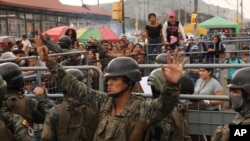As of Friday alone, 12,500 prisoners in 10 prisons in Ecuador will receive food from a private provider, which has suspended service, due to government debts amounting to $1 million. The Ombudsman’s Office warns that this could mean a violation of prisoners’ rights.
The prisons, which have been under military control since January, house a total of 32,039 people – a recorded figure at the end of April – although their capacity is 27,714 prisoners, meaning there is overcrowding of more than 15%.
La Fattoria, a company that has run a prison food operation for more than a decade, suspended the service after clashing accusations with the government, which accused it of alleged corruption and “alleged links to organized crime.” Although he has not provided public evidence regarding this accusation.
The company, for its part, says the government’s complaints are “empty and baseless” and claims the government owes it $10 million for the last six months of service.
Fattoria – who, according to her lawyer, received $2.50 for each prisoner’s daily food – intends to hand over on Friday, before a notary, the spaces she occupied in 10 prisons in Guayaquil. Their lawyer, Geoffrey Campagna, told the Associated Press that they must “record” the evacuation of facilities, such as the kitchen and other spaces they used in their operation.
The National Service for Persons Deprived of Liberty, the body responsible for prisons, has remained silent about this since May 17, when it stated in a statement that it was working in the “pre-contractual” phase of granting rights. A new contract for food services in prisons.
The AP consulted on Friday about the planned mechanism to replace the service that ends today in Guayaquil but did not receive a response.
The contract to provide food in these prisons was effective from 2023 and was scheduled to end in 2025.
At the end of April, Lavatoria suspended its food service in other prisons in the north and center of the country, because it claimed that although it had delivered food, the government had not paid the corresponding amounts.
According to their lawyers, approximately 12,000 prisoners in these prisons in Cotopaxi, Pichincha, Sucumbios, Esmeraldas, Santo Domingo de los Tsachilas, Carchi and Imbabura have been suffering from food shortages since the suspension of service.
“In the coming days, the situation will worsen because the government has not appointed another company,” Campagna said, insisting that providing this service “requires significant infrastructure, solvency and expertise.”
In Latacunga prison, located in the center of the country – one of the largest prisons in the country – relatives of prisoners tried to supplement the service that was suspended a month ago with donations. Since the beginning of May, several local media outlets have broadcast images of raw food and fruit deliveries in bags that were searched by guards at the entrances.
This difficult situation has been confirmed by the Office of the Ombudsman, which has made several visits to prisons in recent weeks. On Tuesday, the Foundation reminded the government that the state is responsible for ensuring respect for the right of prisoners in its custody to obtain food.
Rodrigo Valera, coordinator of human rights protection in the Office of the Ombudsman, told the Associated Press that prisoners face difficulties in feeding themselves, after the suspension of service. He said that in some prisons in the center and north of the country they receive two meals, and in others only one meal. This represents a failure to adhere to international standards that stipulate that they should receive three nutritious and varied meals a day.
He also said that the donated food they receive in prisons is prepared by the inmates themselves.
In Ecuador, prisons are under the control of military forces, amid a wave of violence and internal armed conflict announced by President Daniel Noboa since the beginning of January.
According to the authorities, the prison centers served as command centers for criminal gangs with links to transnational drug trafficking organizations that they hold responsible for the wave of violence and insecurity in the country, including prison massacres that since 2021 have left half a thousand prisoners. killing.
Connect with Voice of America! Subscribe to our channels Youtube, WhatsApp And to the newsletter. Turn on notifications and follow us Facebook, s And Instagram.

“Unapologetic tv specialist. Hardcore zombie trailblazer. Infuriatingly humble problem solver.”

